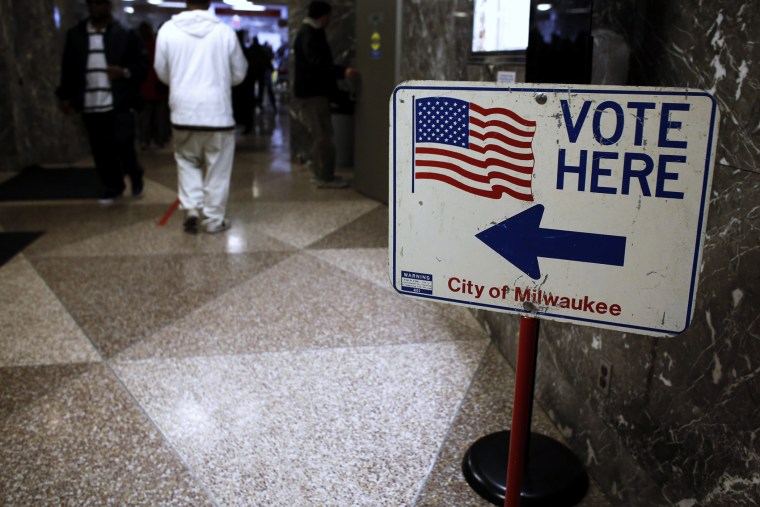Last fall, Wisconsin Gov. Scott Walker's (R) voter-ID law became one of election's biggest
fiascos. Despite the fact that there were no documented incidents in modern Wisconsin history of a voter committing voter fraud, Republican officials in Wisconsin sought to impose a needlessly difficult ID law that could, according to independent estimates, disenfranchise roughly 300,000 legal, eligible Wisconsin voters.
All to address a problem that doesn't exist.
In October, just weeks before Election Day, the U.S. Supreme Court
blocked implementation of the state measure, kicking the issue to the new year. For voting-rights advocates, it was a temporary reprieve, which appears to have ended today -- the high court announced today it
will not consider the case on the merits.
As a practical matter, this means the voter-suppression tactic will be implemented in next year's election cycle, thanks to a ruling from the 7th Circuit. That said, msnbc's Emma Margolin noted
that some voting-rights proponents believe today's inaction "may be a blessing in disguise."
As Election Law Blog's Rick Hasen writes, taking the Wisconsin case -- Frank v. Walker -- to the nation's highest court "divided the civil rights community." The Department of Justice did not file a supportive brief urging the Supreme Court to take the case. And Daniel Tokaji, a law professor at Ohio State University, recently told msnbc's Zack Roth that it was a mistake for the Wisconsin plaintiffs to ask the Supreme Court for review, rather than wait for a different case out of Texas to make its way through the appeals process. That's because Wisconsin officials, who lost at the trial court level but prevailed in the 7th Circuit Court of Appeals, stood a very good chance at swaying a majority of the Supreme Court justices to uphold the voter ID law and set a strong precedent in favor of similar measures.
Legal strategizing can get tricky. For voting-rights advocates, the broader goal is to have the Supreme Court hear the case that gives voting proponents the best chance for sweeping success. It's not that these progressive voices like the Wisconsin law -- they don't -- it's just that they believe it's in voters' interest for the justices to hear a different case.
In the Texas voter id case, now pending before the 5th Circuit, we have a holding that Texas's passage of the voter id law was the product of intentional racial discrimination. That's a finding which should be very hard to reverse on appeal. it provides an easier constitutional path for the Supreme Court to strike down Texas's voter id law. The upside of that would be a Supreme Court decision striking down a voter id law on constitutional grounds. The downside is that other cases, like Wisconsin, do not involve intentional discrimination and so a Texas holding might not help very much outside of Texas.
On the other hand, Ari Berman does a nice job
documenting just how odious the Wisconsin statute is and highlights the consequences of today's announcement: "[T]he Court's decision not to hear the case means that one of the most restrictive laws in the country, in a crucial swing state, will now stand, and the broader constitutionality of voter ID laws will not be resolved before the 2016 election. When it comes to the current Supreme Court and voting rights, the options range from bad to worse."
When the issue is voting rights and voter-suppression campaigns, I feel like that phrase keeps coming up.
